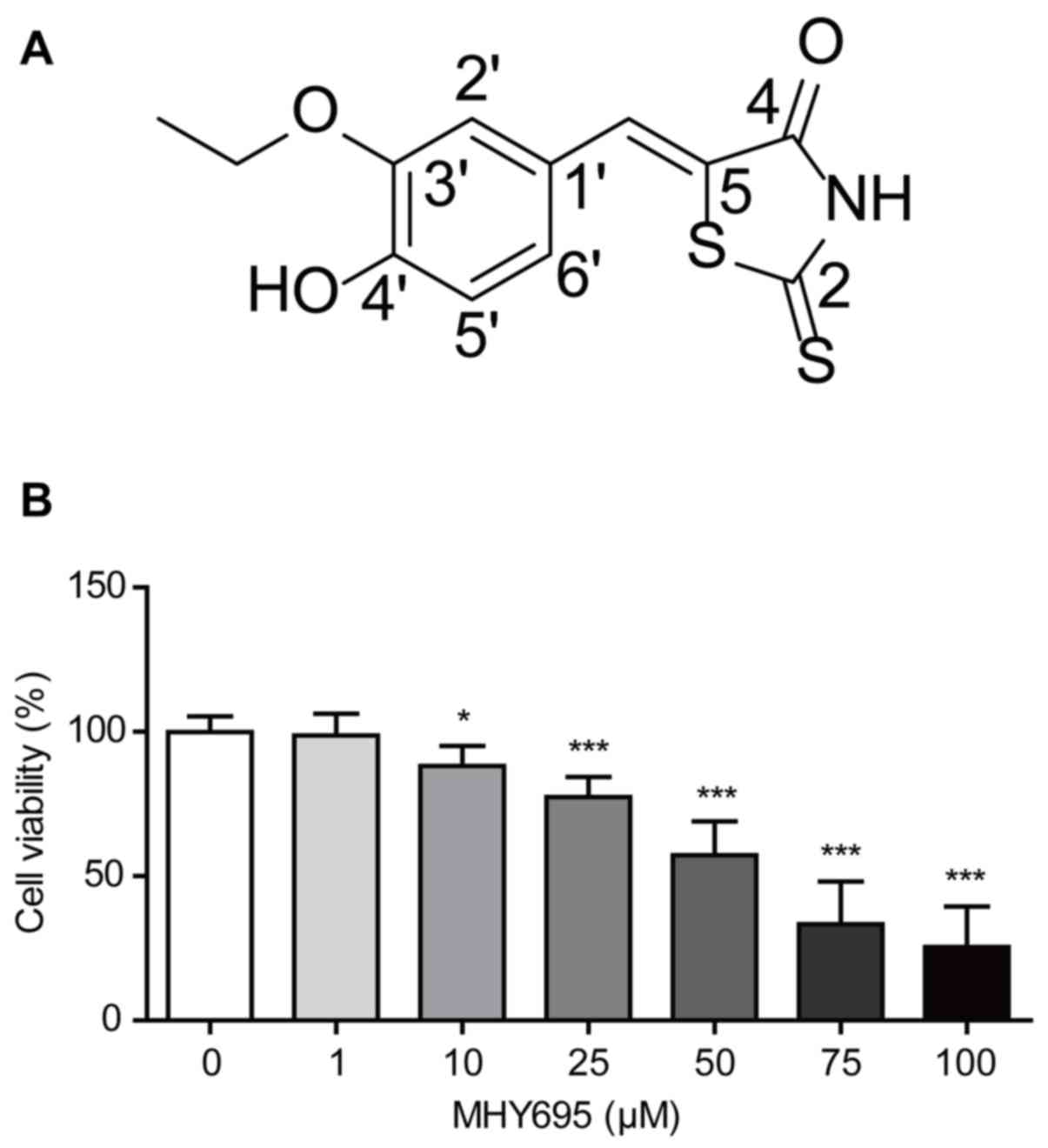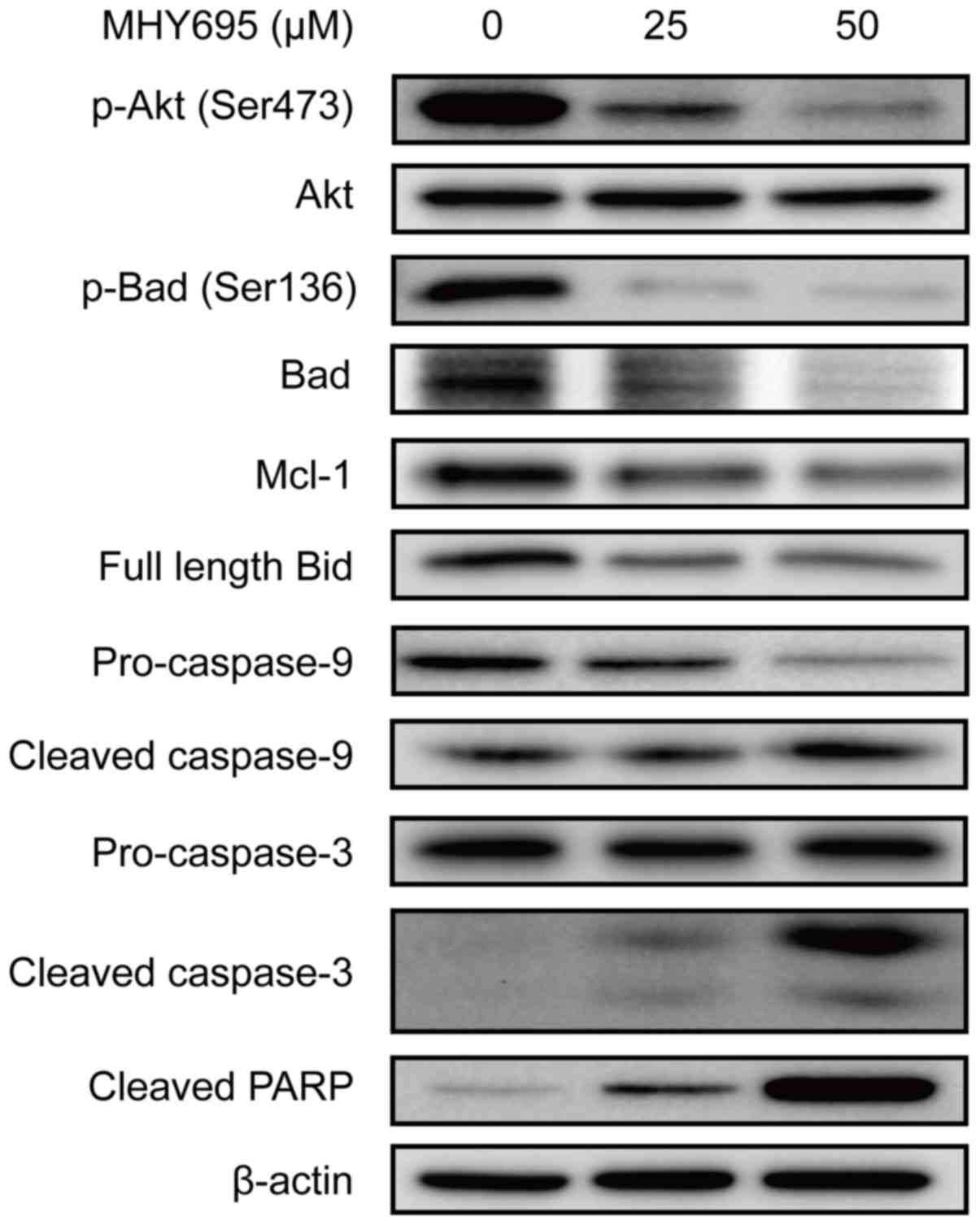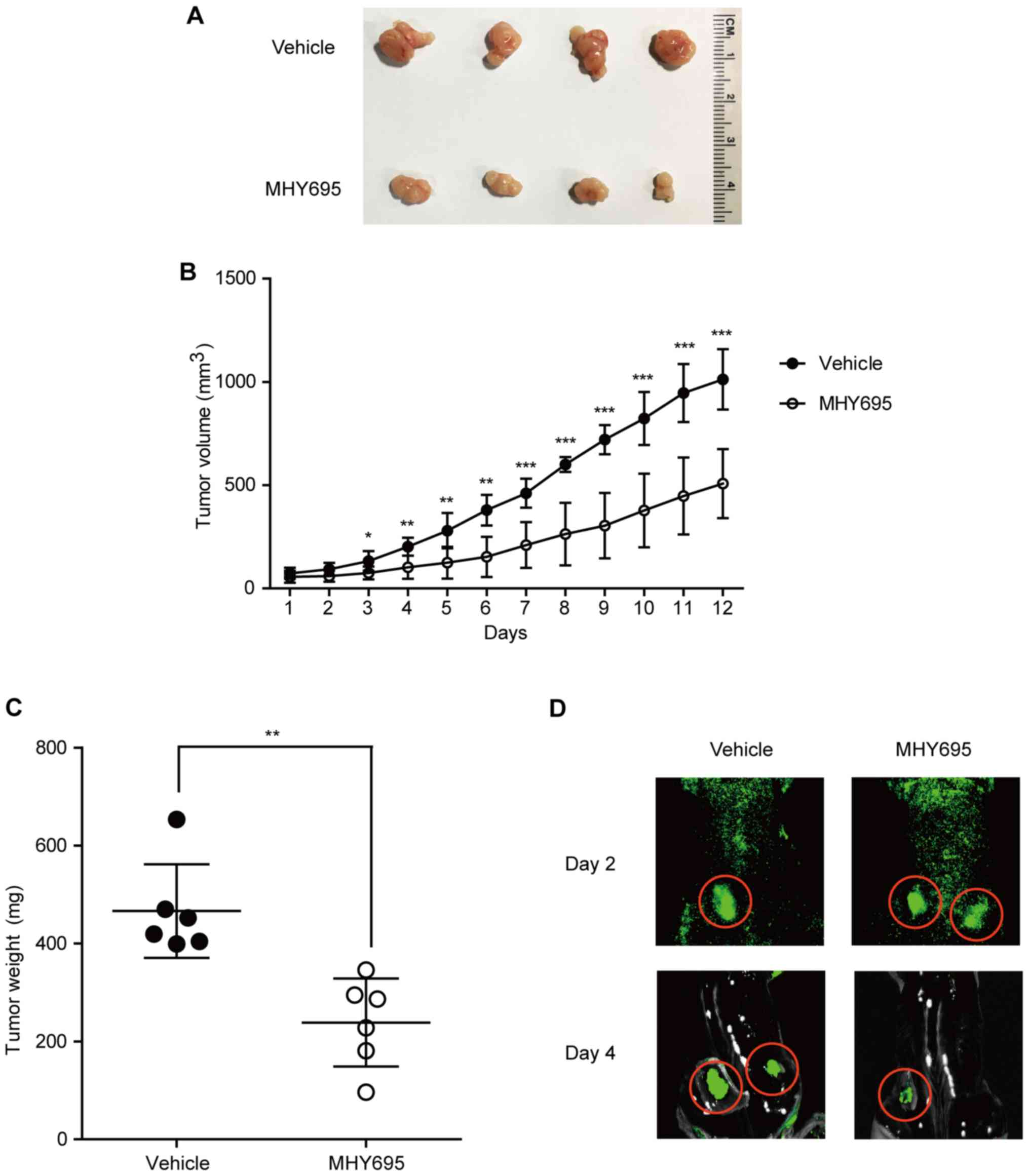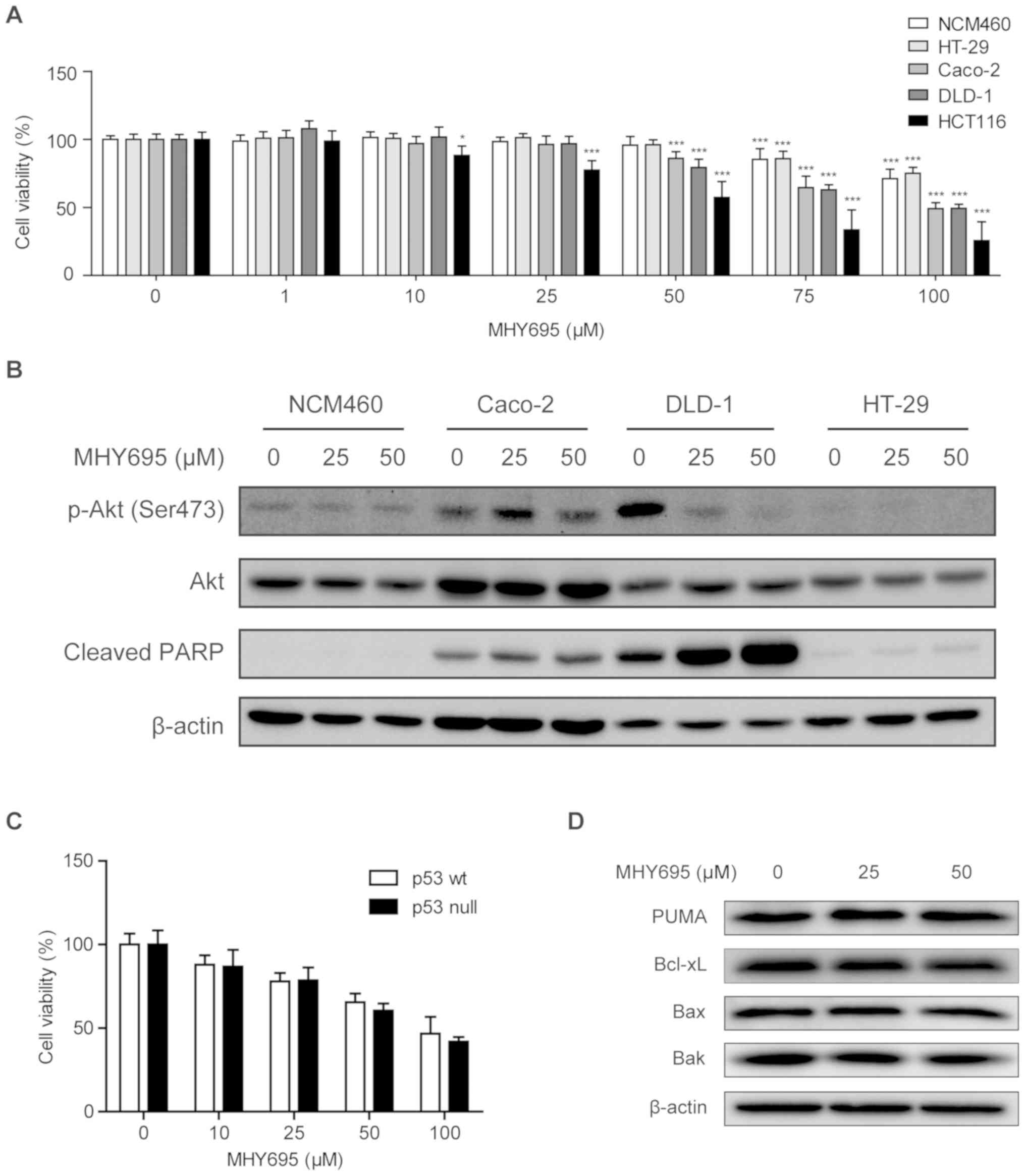|
1
|
Siegel RL, Miller KD and Jemal A: Cancer
Statistics, 2017. CA Cancer J Clin. 67:7–30. 2017. View Article : Google Scholar : PubMed/NCBI
|
|
2
|
Jung KW, Won YJ, Oh CM, Kong HJ, Lee DH,
Lee KH and Community of Population-Based Regional Cancer
Registries: Cancer Statistics in Korea: Incidence, mortality,
survival, and prevalence in 2014. Cancer Res Treat. 49:292–305.
2017. View Article : Google Scholar : PubMed/NCBI
|
|
3
|
Benson AB III, Venook AP, Cederquist L,
Chan E, Chen YJ, Cooper HS, Deming D, Engstrom PF, Enzinger PC,
Fichera A, Grem JL, et al: Colon cancer, version 1.2017, NCCN
clinical practice guidelines in oncology. J Natl Compr Canc Netw.
15:370–398. 2017. View Article : Google Scholar : PubMed/NCBI
|
|
4
|
Kerr JF, Wyllie AH and Currie AR:
Apoptosis: A basic biological phenomenon with wide-ranging
implications in tissue kinetics. Br J Cancer. 26:239–257. 1972.
View Article : Google Scholar : PubMed/NCBI
|
|
5
|
Levin S, Bucci TJ, Cohen SM, Fix AS,
Hardisty JF, LeGrand EK, Maronpot RR and Trump BF: The nomenclature
of cell death: Recommendations of an ad hoc Committee of the
society of toxicologic pathologists. Toxicol Pathol. 27:484–490.
1999. View Article : Google Scholar : PubMed/NCBI
|
|
6
|
Elmore S: Apoptosis: A review of
programmed cell death. Toxicol Pathol. 35:495–516. 2007. View Article : Google Scholar : PubMed/NCBI
|
|
7
|
Li H, Zhu H, Xu CJ and Yuan J: Cleavage of
BID by caspase-8 mediates the mitochondrial damage in the Fas
pathway of apoptosis. Cell. 94:491–501. 1998. View Article : Google Scholar : PubMed/NCBI
|
|
8
|
Datta SR, Dudek H, Tao X, Masters S, Fu H,
Gotoh Y and Greenberg ME: Akt phosphorylation of BAD couples
survival signals to the cell-intrinsic death machinery. Cell.
91:231–241. 1997. View Article : Google Scholar : PubMed/NCBI
|
|
9
|
Cai J, Yang J and Jones DP: Mitochondrial
control of apoptosis: the role of cytochrome c. Biochim Biophys
Acta. 1366:139–149. 1998. View Article : Google Scholar : PubMed/NCBI
|
|
10
|
Slee EA, Adrain C and Martin SJ:
Executioner caspase-3, −6, and −7 perform distinct, non-redundant
roles during the demolition phase of apoptosis. J Biol Chem.
276:7320–7326. 2001. View Article : Google Scholar : PubMed/NCBI
|
|
11
|
Choi PR, Kang YJ, Sung B, Kim JH, Moon HR,
Chung HY, Kim SE, Park MI, Park SJ and Kim ND: MHY218-induced
apoptotic cell death is enhanced by the inhibition of autophagy in
AGS human gastric cancer cells. Int J Oncol. 47:563–572. 2015.
View Article : Google Scholar : PubMed/NCBI
|
|
12
|
Jeon HS, Ahn MY, Park JH, Kim TH, Chun P,
Kim WH, Kim J, Moon HR, Jung JH and Kim HS: Anticancer effects of
the MHY218 novel hydroxamic acid-derived histone deacetylase
inhibitor in human ovarian cancer cells. Int J Oncol. 37:419–428.
2010.PubMed/NCBI
|
|
13
|
Kim MK, Kang YJ, Kim DH, Hossain MA, Jang
JY, Lee SH, Yoon JH, Chun P, Moon HR, Kim HS, et al: A novel
hydroxamic acid derivative, MHY218, induces apoptosis and cell
cycle arrest through downregulation of NF-κB in HCT116 human colon
cancer cells. Int J Oncol. 44:256–264. 2014. View Article : Google Scholar : PubMed/NCBI
|
|
14
|
Park JH, Ahn MY, Kim TH, Yoon S, Kang KW,
Lee J, Moon HR, Jung JH, Chung HY and Kim HS: A new synthetic HDAC
inhibitor, MHY218, induces apoptosis or autophagy-related cell
death in tamoxifen-resistant MCF-7 breast cancer cells. Invest New
Drugs. 30:1887–1898. 2012. View Article : Google Scholar : PubMed/NCBI
|
|
15
|
De U, Kundu S, Patra N, Ahn MY, Ahn JH,
Son JY, Yoon JH, Moon HR, Lee BM and Kim HS: A new histone
deacetylase inhibitor, MHY219, inhibits the migration of human
prostate cancer cells via HDAC1. Biomol Ther (Seoul). 23:434–441.
2015. View Article : Google Scholar : PubMed/NCBI
|
|
16
|
Patra N, De U, Kim TH, Lee YJ, Ahn MY, Kim
ND, Yoon JH, Choi WS, Moon HR, Lee BM and Kim HS: A novel histone
deacetylase (HDAC) inhibitor MHY219 induces apoptosis via
up-regulation of androgen receptor expression in human prostate
cancer cells. Biomed Pharmacother. 67:407–415. 2013. View Article : Google Scholar : PubMed/NCBI
|
|
17
|
Lee SH, Kang YJ, Kim DH, Sung B, Kang JA,
Chun P, Yoon JH, Moon HR, Kim HS, Chung HY and Kim ND: A novel
oxiranylchromenone derivative, MHY336, induces apoptosis and cell
cycle arrest via a p53- and p21-dependent pathway in HCT116 human
colon cancer cells. Int J Oncol. 44:943–949. 2014. View Article : Google Scholar : PubMed/NCBI
|
|
18
|
Patra N, De U, Kang JA, Kim JM, Ahn MY,
Lee J, Jung JH, Chung HY, Moon HR and Kim HS: A novel epoxypropoxy
flavonoid derivative and topoisomerase II inhibitor, MHY336,
induces apoptosis in prostate cancer cells. Eur J Pharmacol.
658:98–107. 2011. View Article : Google Scholar : PubMed/NCBI
|
|
19
|
Yoon S, Kim JH, Lee YJ, Ahn MY, Choi G,
Kim WK, Yang Z, Lee HJ, Moon HR and Kim HS: A novel carbazole
derivative, MHY407, sensitizes cancer cells to doxorubicin-,
etoposide-, and radiation treatment via DNA damage. Eur J
Pharmacol. 697:24–31. 2012. View Article : Google Scholar : PubMed/NCBI
|
|
20
|
De U, Chun P, Choi WS, Lee BM, Kim ND,
Moon HR, Jung JH and Kim HS: A novel anthracene derivative, MHY412,
induces apoptosis in doxorubicin-resistant MCF-7/Adr human breast
cancer cells through cell cycle arrest and downregulation of
P-glycoprotein expression. Int J Oncol. 44:167–176. 2014.
View Article : Google Scholar : PubMed/NCBI
|
|
21
|
Hwang HJ, Kang YJ, Hossain MA, Kim DH,
Jang JY, Lee SH, Yoon JH, Moon HR, Kim HS, Chung HY and Kim ND:
Novel dihydrobenzofuro[4,5-b][1,8]naphthyridin-6-one derivative,
MHY-449, induces apoptosis and cell cycle arrest in HCT116 human
colon cancer cells. Int J Oncol. 41:2057–2064. 2012. View Article : Google Scholar : PubMed/NCBI
|
|
22
|
Kim SH, Kang YJ, Sung B, Kim DH, Lim HS,
Kim HR, Kim SJ, Yoon JH, Moon HR, Chung HY and Kim ND: MHY-449, a
novel dihydrobenzofuro[4,5-b][1,8]naphthyridin-6-one derivative,
mediates oxidative stress-induced apoptosis in AGS human gastric
cancer cells. Oncol Rep. 34:288–294. 2015. View Article : Google Scholar : PubMed/NCBI
|
|
23
|
Lee SH, Kang YJ, Sung B, Kim DH, Lim HS,
Kim HR, Kim SJ, Yoon JH, Moon HR, Chung HY and Kim ND: MHY-449, a
novel dihydrobenzofuro[4,5-b][1,8] naphthyridin-6-one derivative,
induces apoptotic cell death through modulation of Akt/FoxO1 and
ERK signaling in PC3 human prostate cancer cells. Int J Oncol.
44:905–911. 2014. View Article : Google Scholar : PubMed/NCBI
|
|
24
|
Lim HS, Kang YJ, Sung B, Kim SH, Kim MJ,
Kim HR, Kim SJ, Choi YH, Moon HR, Chung HY and Kim ND: Novel
dihydrobenzofuro[4,5-b][1,8]naphthyridin-6-one derivative, MHY-449,
induces cell cycle arrest and apoptosis via the downregulation of
Akt in human lung cancer cells. Oncol Rep. 34:2431–2438. 2015.
View Article : Google Scholar : PubMed/NCBI
|
|
25
|
Jada SR, Matthews C, Saad MS, Hamzah AS,
Lajis NH, Stevens MF and Stanslas J: Benzylidene derivatives of
andrographolide inhibit growth of breast and colon cancer cells in
vitro by inducing G(1) arrest and apoptosis. Br J Pharmacol.
155:641–654. 2008. View Article : Google Scholar : PubMed/NCBI
|
|
26
|
Zuliani V, Carmi C, Rivara M, Fantini M,
Lodola A, Vacondio F, Bordi F, Plazzi PV, Cavazzoni A, Galetti M,
et al: 5-Benzylidene-hydantoins: Synthesis and antiproliferative
activity on A549 lung cancer cell line. Eur J Med Chem.
44:3471–3479. 2009. View Article : Google Scholar : PubMed/NCBI
|
|
27
|
Yang X, Wang W, Qin JJ, Wang MH, Sharma H,
Buolamwini JK, Wang H and Zhang R: JKA97, a novel benzylidene
analog of harmine, exerts anti-cancer effects by inducing G1
arrest, apoptosis, and p53-independent up-regulation of p21. PLoS
One. 7:e343032012. View Article : Google Scholar : PubMed/NCBI
|
|
28
|
Pinson JA, Schmidt-Kittler O, Zhu J,
Jennings IG, Kinzler KW, Vogelstein B, Chalmers DK and Thompson PE:
Thiazolidinedione-based PI3Kα inhibitors: An analysis of
biochemical and virtual screening methods. Chem Med Chem.
6:514–522. 2011. View Article : Google Scholar : PubMed/NCBI
|
|
29
|
Ahmed D, Eide PW, Eilertsen IA, Danielsen
SA, Eknæs M, Hektoen M, Lind GE and Lothe RA: Epigenetic and
genetic features of 24 colon cancer cell lines. Oncogenesis.
2:e712013. View Article : Google Scholar : PubMed/NCBI
|
|
30
|
Nakano K and Vousden KH: PUMA, a novel
proapoptotic gene, is induced by p53. Mol Cell. 7:683–694. 2001.
View Article : Google Scholar : PubMed/NCBI
|
|
31
|
Ashkenazi A: Directing cancer cells to
self-destruct with pro-apoptotic receptor agonists. Nat Rev Drug
Discov. 7:1001–1012. 2008. View Article : Google Scholar : PubMed/NCBI
|
|
32
|
Wei MC, Zong WX, Cheng EH, Lindsten T,
Panoutsakopoulou V, Ross AJ, Roth KA, MacGregor GR, Thompson CB and
Korsmeyer SJ: Proapoptotic BAX and BAK: A requisite gateway to
mitochondrial dysfunction and death. Science. 292:727–730. 2001.
View Article : Google Scholar : PubMed/NCBI
|
|
33
|
Wang X, McCullough KD, Franke TF and
Holbrook NJ: Epidermal growth factor receptor-dependent Akt
activation by oxidative stress enhances cell survival. J Biol Chem.
275:14624–14631. 2000. View Article : Google Scholar : PubMed/NCBI
|
|
34
|
Hu Y, Lu H and Zhang J, Chen J, Chai Z and
Zhang J: Essential role of AKT in tumor cells addicted to FGFR.
Anticancer Drugs. 25:183–188. 2014. View Article : Google Scholar : PubMed/NCBI
|



















